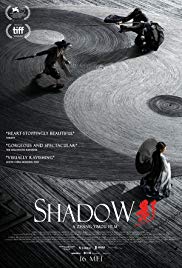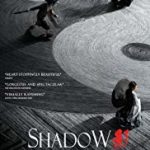 Director: Zhang Yimou
Director: Zhang Yimou
Writer: Wei Li and Zhang Yimou
Starring: Deng Chao, Sun Li, Zheng Kai, Wang Qianyuan, Hu Jun, Guan Xiaotong, Leo Wu
Without the real, there can be no ‘shadow’.
If you’ve ever longed for a beautifully high contrast fairy tale that involves duels with bladed umbrellas, war wizards hiding in caves, angry zither playing, some basic “duality of man” theme work, and a lot of palace intrigue, then have I got a movie for you.
Shadow is the latest from Zhang Yimou, known for his gorgeous wuxia films like Hero and House of Flying Daggers. I adore Hero, so I wouldn’t put Shadow on the same level, but I still liked it a lot, and it’s easily as good as House of Flying Daggers. Shadow has a real throwback vibe where it isn’t afraid to be so dramatic that it borders on goofy, and I appreciated that. It felt honest and refreshing. There’s no layer of ironic detachment to any of it.
The story is about the kingdom of Pei and Commander Ziyu (Deng Chao), who lost a duel with Yang (Hu Jun) some time ago and lost Jing City to the kingdom of Yang. The King of Pei (Zheng Kai) is upset when he finds out that the Commander has challenged Yang to a rematch to try to win back Jing City. In these early scenes, we’re introduced to most of our main characters, and they all make a quick impression. The King is an artsy coward, the King’s sister Qingping (Guan Xiaotong) is strong-willed and a little childish, the Commander is stoic and noble—which is a stark contrast with the king himself—and Xiao Ai is the Commander’s wife, who is equally noble and devoted.
It isn’t until the Commander and his wife return home that we discover the truth. The strong, heroic Commander we’ve seen is actually a “shadow”—a lookalike trained to be a body double—and the real Commander lives hidden away in a cave, recovering from the injury he sustained in the first duel. The shadow is named Jing after the city he was taken from as a child, and he seems to spend most of his time training for the rematch, being abused by the real Commander and pining for Xiao Ai.

That’s basically what the first half of the film is, so if you have a low tolerance for melodrama and royal politics, it might drag for you. I love that kind of stuff, but even if I had found the story boring, I would have still been engaged by the gorgeous production design. The sets and costumes are all variations of grey, white and black in a very fitting, if slightly obvious, nod to the title. The story also takes place during a period of continuous rain, which leaves scenes overcast, the rainfall sometimes seeming like grain and static on the image itself. The effect is wonderful, almost like we’re watching ink and charcoal on paper at times instead of actual, living images.
The performances are across-the-board fantastic, with Deng Chao standing out in particular in the dual role of Commander Ziyu and Jing. His work as the Commander in particular is so damn good. It’s rare to see someone playing a lookalike in a film where they go to so much trouble to change and contrast the two characters. The Commander is warped and twisted—as much from his desire for vengeance as his still-festering wound—and Deng Chao plays it like a mix between Gollum and Saruman, hiding in his cave and scheming. Compared to that, playing Jing seems downright easy since it’s mostly about being handsome, heroic, and occasionally cowed. The true mark of his success is the fact that I continuously forgot that both characters were being played by the same actor.
Even if all of that wasn’t enough to get you through the slower, talkier scenes of the first half, once the action breaks out, I dare you not to watch with a smile on your face. Zhang Yimou knows how to direct action, and he’s especially good at making it seem truly and literally balletic. There are multiple fights on large yin yang designs involving long spears and spinning, bladed umbrellas. All of the elements in these fights—the rain, the color contrasts, the contrasted movements of the weapons—are used so well together, creating some truly remarkable imagery.
It’s this part of the film where the monochromatic design choices are used most effectively because the final fights are packed with enough blood spray to please even a discerning horror fan. The beautiful backgrounds become a canvas for the gore, the perfect heightening and highlighting for the film’s finale.
If you’re a fan of Zhang Yimou’s previous work, then Shadow is absolutely worth a watch. I’m sure a few people will be turned off by the slower first half, but I don’t care about them. Shadow is one of the best movies I’ve seen this year, and it’s one I’ll be showing to my friends for years to come.




